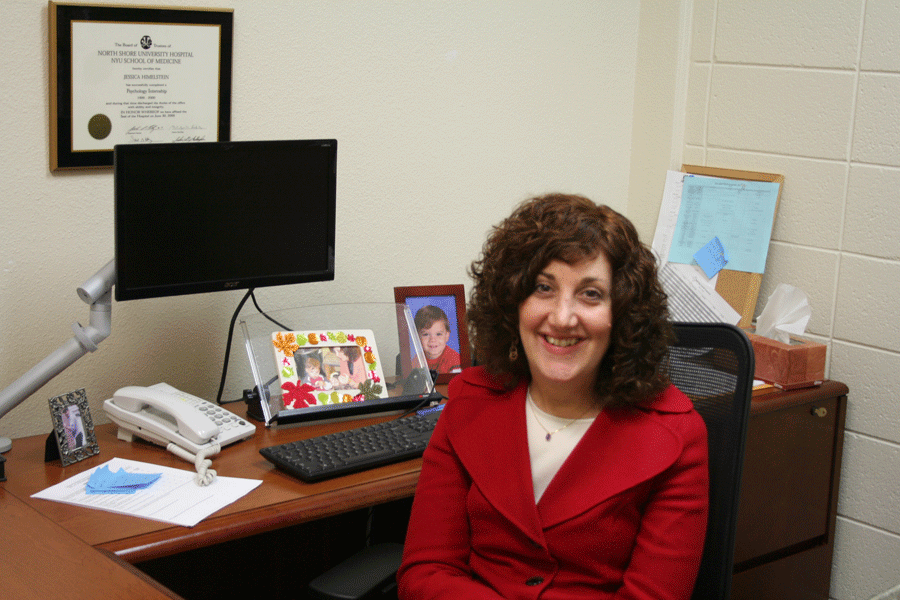East coast native Jessica Kalmar, assistant professor of psychology, brings experience from her many different research projects to the psychology program at Lakeland.
“Kalmar adds experience and understanding to the psychology program. Her experience in research provides great insight and expertise on not only concepts but also application in the process of psychology,” said Kim Anderson, a nontraditional senior majoring in religion.
While Kalmar loves everything about research, one project sticks out in her mind. While doing research at the Mt. Sinai School of Medicine, she had the opportunity to follow a group of boys who had attention-deficit/hyperactivity disorder (ADHD).
She wanted to figure out if there was a relationship between low serotonin (which is a neurotransmitter) as a child and aggressive behavior as a teen because there had been inconsistent findings on the relationship between aggressive behavior and serotonergic functioning in children.
The project started when the boys were between the ages of seven and eleven and went until they were in their teens.
“It was very interesting to me, first of all on a personal level—getting to see these boys come back time and time again to our laboratory and watch them grow up and really be involved in that process. It was very exciting when we found out that there really is a relationship between childhood levels of serotonin and aggressive behavior in adolescence,” said Kalmar.
The relationship she found was that if a boy had low serotonin as a child, he was more likely to have aggressive and delinquent behavior as a teen. If his serotonin level was relatively high in childhood, it seemed to protect the youth, and the boy got into less trouble.
Kalmar got her bachelor’s degree in psychology and political science from Stern College of Yeshiva University. Her PhD, from the Graduate Center of the City University of New York, is in neuropsychology, which focuses on the relationship between the brain and behavior.
Dr. Kalmar had to wait for the young boys in her research study to reach adolescence, which is why it took her eight years to complete her PhD. During that time, she took advantage of several opportunities to travel abroad for community service projects.
“I always felt that I was really getting a lot out of all of those experiences, and they made me a more well-rounded person. When I was finished, I had a lot more to offer to my students and my research,” said Kalmar.
One of the opportunities was going to Israel a few times to help immigrants adjust to the culture. She is Jewish and can speak Hebrew, which helped her to aid others. She took several other trips to the former Soviet Union to help people who wanted to know what it meant to be Jewish now that they could be free to explore their religion.
After finishing school and two postdoctoral positions, she became an associate research scientist at Yale’s medical school. While there, she worked in the psychiatry department. According to her, she was interested in working with youth who have different mental illnesses because she wanted to figure out what puts people at risk for poor outcomes as they grow up.
When she decided to start a family, she resigned from Yale to become a stay-at-home mom. Now that her children are in school, she decided to go back to work. Her husband found a job in the area, so they moved up here.
When the opportunity came up at Lakeland, she was thrilled by the great fit and decided to go for it.
“I wanted to go back to teaching at an institution that was going to be small and that would allow me to develop really close relationships with the students and support them in the same way that I had support from my faculty members when I was in school,” said Kalmar.
See KALMAR on page 10
KALMAR from page 11
Now that she is at Lakeland, she is helping to make changes to the psychology program, which will be unveiled soon.
The psychology lab is also undergoing changes, which she is overseeing. At the moment, they are beginning research projects that look at the stigma that is associated with mental illness.
Kalmar would like to develop some kind of educational program that the psychology lab group can share with Lakeland and the Sheboygan community if they find out some interesting facts about the stigma surrounding mental illness.
“Kalmar brings many strengths to Lakeland and the Psychology program. One strength to highlight would be her clinical and research experiences which will undoubtedly enliven her classes with engaging examples,” said Elizabeth Stroot, associate professor of psychology.
Kalmar’s students also enjoy her classes and how she teaches.
“What I like about the class is that the class is very fun. I love the information we learn in the class and I love the way that we learn it by having discussions through power points that she puts together,” said Demonta Hall, junior communication major.
“She gives us more than enough time to review for our quizzes and exams, is very helpful and always available to her students. Even if she is not available, she gives us other resources that are very helpful. I think she adds excitement and liveliness to the psychology program,” said Dorothy Martin, freshman psychology major.
When she is not here at Lakeland, Kalmar enjoys spending time outside with her family.
“Some of the things that [my family] loves so much about living in the Midwest is how friendly people are and that we have so much more space than we had on the east coast,” said Kalmar.


